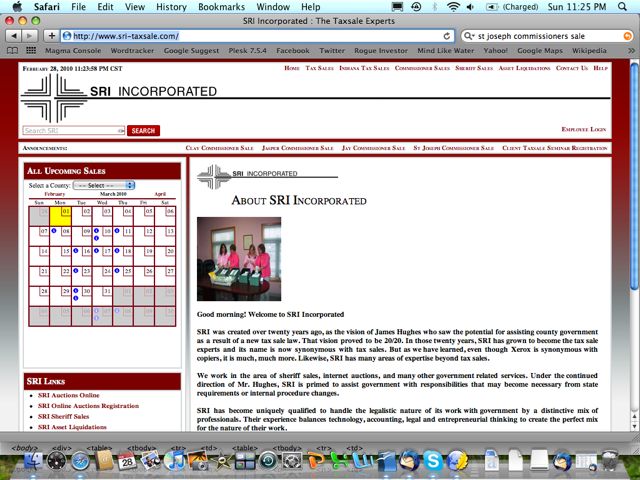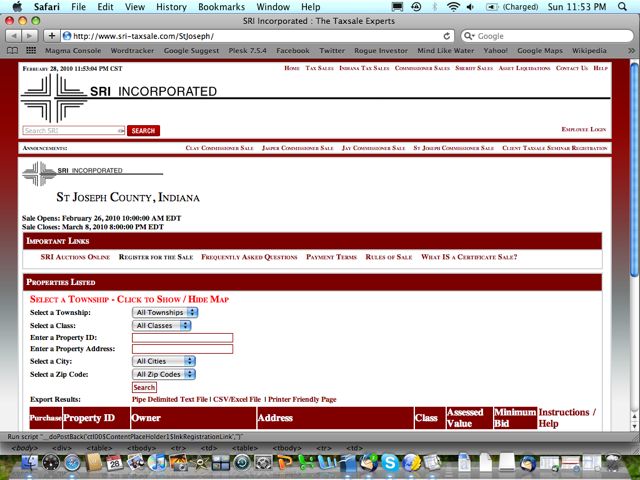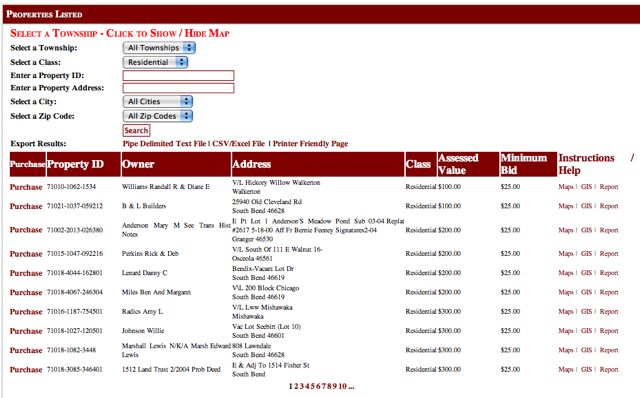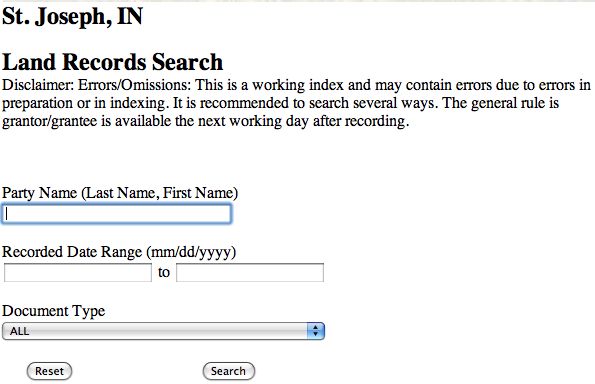St.
Joseph, Indiana Commissioners' Online Tax Lien Sale
Indiana is one of my favorite states for tax lien investing. Every year
Indiana conducts tax lien sales from roughly August through October,
depending upon the county. Several of the Indiana counties have gone
online and their service of choice is SRI. Any tax liens that are not purchased at the regular sale are made
available through the Commissioner's sale. Before I discuss this sale,
I would like you to understand the tax sale laws of Indiana. TAX LIEN CERTIFICATE SALES The
public auction or "Tax Sale" of real property is required by Indiana
law. The statute governing tax sales in Indiana is Indiana Code (I.C.)
6-1.1-24 and 25. The law requires: that
all properties with delinquent taxes, penalties, and special assessment
liens for unpaid sewer user charges, delinquent weed cutting fees,
delinquent solid waste service fees, delinquent storm water fees,
delinquent health and hospital liens, and DMD liens as specified by law
be auctioned at the Treasurer's Tax Sale.
The
law allows the County Auditor and County Treasurer, who are responsible
for the tax sales, options regarding the manner in which the tax sale
may be conducted. Therefore, the exact procedures by which a county
conducts a tax sale for properties with delinquent taxes and special
assessments may differ from county to county. Tax Sale Date:
Typically, tax liens are sold once a year and the sales can be held any
time during a year, based upon the first collection of taxes. Indiana
law requires the County Treasurer to provide to the County Auditor on
or before July 1st a list that certifies all tax sale eligible
properties as of that date. Tax sale eligible is defined as any entity
that is delinquent from the prior year’s spring installment. Tax sales
must be held no later than 171 days after the list is certified to the
County Auditor. Eligibility:
A person (or an agent of a person) who owes costs directly attributable
to a prior tax sale, delinquent taxes, special assessments, penalties,
or interest may not purchase property in a tax sale other than their
own property (I.C. 6-1.1-24-5.3[a][5]). Bidding Process: Indiana is a bid-up state. In otherwords, you start bidding at the
minimum bid and increase your bid until you win. For online auctions
it is typically done by proxy, meaning that you can set your bid at your
maximum and the program will bid for you in the required increments
until you win. If you are outbid, you will be notified and have a
chance to increase your bid. Minimum Bid: Property at the sale will not be sold for an amount less than: - the delinquent taxes and special assessments on each tract or item of real property,
- the
taxes and special assessments on each tract or item of real property
that are due and payable in the year of the sale, whether or not they
are delinquent,
- all penalties due on the delinquencies,
- an amount prescribed by the county auditor that equals the sum of:
- the greater of twenty-five dollars ($25) or postage and publication costs; and
- any other actual costs incurred by the county that are directly attributable to the tax sale, and
- any unpaid costs due under subsection (b) from a prior tax sale. (IC 6-1.1-24-2[a]).
Redemption Period:
The redemption period for A items (properties not in the last year’s
sale) is one year after the date of the sale of the certificate (I.C.
6-1.1-25-4[a]). Subsequent Taxes:
During the period between the tax sale date and the expiration of the
redemption period and prior to the issuance of a deed, the certificate
holder may pay all taxes, assessments, penalties and costs due for the
property. Immediately upon paying for any of these additional costs,
the certificate holder should report the payments to the County
Auditor's office with the receipts to record them. The certificate
holder can be reimbursed for those taxes (plus interest at the rate of
10% per annum) upon redemption if he files a 137B form. Redemption Fee: The redemption fee is calculated in two parts (three parts if taxes are paid subsequent to the tax sale): 1. On the Minimum Bid: - 110% of the minimum bid if redeemed not more than 6 months after the date of sale
- 115% of the minimum bid if redeemed more than 6 months but not more than one year after the date of sale.
2.
On the difference between the successful bid price and the minimum bid
(referred to as tax sale overbid): 10% per annum interest from the date
of payment to the date of redemption. 3. On any taxes and
special assessments paid by the certificate holder subsequent to the
sale: 10% per annum interest from the date of payment to the date of
redemption. 4.5 and 4.6 Notices:
Not less than three months prior to the expiration of the redemption
period (12 months from the date of sale), the certificate holder must
send a Notice of Sale by certified mail to the property owner and any
person with a substantial interest in the property. The Notice must
include all the information required in I.C. 6-1.1-25-4.5. These
notices are referred to as “4.5 Notices.” It is typically
recommended that the certificate holder initiate a title search on the
property to identify the legal owner and any persons with a substantial
interest of public record prior to sending this notice by certified
mail. If the property is redeemed, the property owner will be required
by law to reimburse the certificate holder for her actual paid title
search expenses, not exceeding the amount established by the county, if
a form 137B was filed with the County Auditor prior to the date the
property owner redeemed the property. Indiana law does allow the
certificate holder to file a request with the court to be reimbursed
for an amount greater than the ceiling set by the county for title
search and noticing and attorney fees. The certificate
holder is further required (by I.C. 6-1.1-25-4.6) to send a “4.6
notice” to the interested parties after a year from the sale to notify
them that the redemption period is over and a deed petition is being
filed. Filing Deed Petition:
If the property has not been redeemed, the certificate holder must
petition for a tax deed to the real property within six months after
the expiration of the redemption period. If the tax lien purchaser
fails to do so, the lien against the property is terminated according
to I.C. 6-1.1-25-7(a). All delinquent taxes, penalties,
and/or special assessments which became due subsequent to the tax sale
must be paid before the County Auditor will petition the court to issue
a tax deed to the certificate holder. Penalties for Failure to Comply with Tax Sale Statutes: There are three important penalties to bear in mind: 1.
Failure to Pay Amount Bid: A high bidder who fails to pay the County
Treasurer in a timely manner the full bid amount for the subject
property, in acceptable funds, will have his bid cancelled and be
required to pay a penalty of 25% of the amount of the bid, subject to
prosecution (I.C. 6-1.1-24-8). 2. Failure to Give Adequate
Notice to Owner: A certificate holder who fails to fulfill the
requirements for issuance of a court order directing the County Auditor
to issue a tax deed (i.e., fails to give adequate or timely notice or
provides insufficient supporting documentation) may be required to pay
a penalty equal to 25% of the purchase price. The certificate holder’s
petition for a deed under I.C. 6-1.1-25- 4.6 also may be rejected. 3.
Failure to Give Notification and/or Petition Court: A certificate
holder who fails to provide notice or provides insufficient notice as
required by I.C. 6-1.1-25-4.5 (i.e., fails to notify the property owner
and persons with a substantial property interest of public record to
the tax sale and date of expiration of the period of redemption) may be
required by the court to pay a penalty equal to 100% of the purchase
price. COMMISSIONER’S SALE OF TAX LIEN CERTIFICATES Properties
that do not sell at the regular, "A" tax sale in the fall have a tax
lien certificate issued to the County Board of Commissioners. Indiana
law allows the Commissioners to sell the tax lien certificates, convert
certificates to a tax deed, or do nothing with the certificates. A
second sale of certificates is called a “B” or “expedited” sale. The
reason it is referred to as an “expedited sale” is that the period of
redemption is shortened to 120 days from the date of the sale of the
certificate for the property owner, and the buyer can receive their tax
deed more quickly. (The redemption period of “C” items, which are
marked for redevelopment, is also 120 days.) I.C.
6-1.1-24-6.1 authorizes the Commissioners to sell a tax lien
certificate at a “B” tax sale for an amount that is less that the
amount required at the “A” tax sale. COMMISSIONER’S County-Owned Surplus Sales If
a parcel has gone through the annual tax sale and is not purchased, the
county takes a lien on the property. As discussed above, the County
Board of Commissioners may sell these tax lien certificates at a
second, “B” sale. Alternatively, the county may take title
to any property for which it holds a tax lien by virtue of a tax title
deed, following the same procedures as a lien buyer. (The County
Commissioners may request a tax deed from the County Auditor 120 days
after the tax sale ends.) The property is appraised and a minimum bid
amount established. At the auction, bidding starts with the
minimum bid, with the highest bidder winning the property. There is no
redemption period at a surplus auction. No property may be
sold to a person who is ineligible under I.C. 36-1-11-16. This means
that anyone who is purchasing property previously held by them or by
their principal and that was forfeited because of delinquent taxes
within the last five years, must submit timely payment to the County
Treasurer of all past due amounts. The property is conveyed
from the county to the winning bidder by quitclaim deed, which the
county records. The parcel is owned by the buyer as soon as she
receives the recorded tax deed. Under a new law in 2007, however,
buyers will not be issued a deed until any delinquent property taxes
are made current on property they currently own. Failure to bring all
delinquent property taxes current may result in the voiding of sale of
the parcel, application of money rendered to the delinquent taxes, and
the resale of that parcel in a subsequent sale. According to
state law, the tax deed vests in the grantee an estate in fee simple
absolute, free and clear of all liens and encumbrances “created or
suffered” before or after the tax sale except those liens granted
priority under federal law and the lien of the state or a political
subdivision for taxes and special assessments which accrue subsequent
to the sale and which are not removed by state law. The property is, however, subject to: - all easements, covenants, declarations, and other deed restrictions shown by public records
- laws,
ordinances, and regulations concerning governmental police powers,
including zoning, building, land use, improvements on the land, land
division, and environmental protection
- liens and encumbrances created or suffered by the grantee.
According
to state law, the tax deed is prima facie evidence of valid title in
fee simple in the grantee of the deed. It is also prima facie evidence
that the sale of the real property described in the tax deed was not
irregular, and that all proper proceedings were conducted in a regular
manner. The most recent update of the Indiana Tax Sale Laws is presented here: Indiana Tax Sale Laws (pdf format) - updated for 2010 SRI Online and the St. Joseph County
Board of Commisioners' Tax Lien Sale
Step 1: Sign Up With Online Auction Company
Sign up with SRI Online Auctions and obtain a username and password: https://www.sri-onlineauctions.com/ Once you have signed up you will need to visit this affiliated site also run by SRI: http://www.sri-taxsale.com/ 
Step 2: Sign Up With County
You will then need to sign up with St. Joseph County to participate in the online auction.  Step 3: Rules of the Sale
Step
4: The List
Download
the list that is provided in Excel or comma delimited
format or use the online database and perform searches based upon your
personal criteria. If you download the list, note that you will
probably need to check for redemptions on the database or online system.
In other words, your downloaded list will be accurate as of the date it
was downloaded, but maybe not a day later or even a few hours later. To
find a tax sale list it is not always as easy as typing in a search
engine. The problem is counties control the lists and they do not care
about optimizing websites for Google or Yahoo! The
first
thing to know is which government agency runs the sale. You will need
to check with
the Tax Collector or Treasurer of each county or municipality. In some
cases, the Department of Revenue or Sheriff's Office may run the sale.
Either type in "St. Joseph Indiana
County Tax Collector" in your favorite search engine or better yet go
to
www.naco.org and find "about counties" and search for the county website
(more on this in a separate lesson). Step
5: Screening
One
of the most important concepts in tax lien investing is to be able to
screen lists and come up with what you are potentially interested in
buying. For example, if you are only looking for
residential properties, then enter "residential" in the class of
property. If you prefer searching for agriculture or industrial, then
use those search parameters. As you can imagine, residential properties
typically offer less risk, but more competition.  Location
is also a great way
to screen properties. If you are only interested in certain
neighborhoods or you want to avoid others, then screen out your list
using these criteria. You can search for properties within a given
township, city or zip code. A map is even provided for the township
designations. Be sure to press the "search" button. Using a residential screen of properties in all cities and
townships, you will see that there are more than 10 pages returned, so
we really need another screen. Place your cursor on the "Assessed
Value" header, which is a link, and click. This will re-sort your results
so that the first liens/properties listed are the cheapest. If you
click one more time, it will sort with the most expensive or highest
assessed value properties first. You can do this with "Minimum Bid" and
achieve about the the same results because the minimum bid or taxes
owed will usually be a reflection of the value of the property, unless
multiple years of taxes are due or other taxes are included. Screening
by Assessed Value or Minimum Bid is a great way to remove less
desirable properties with little value. For example, an assessed value
of $100 indicates to me that the property probably has little value. It
is most likely a small lot or piece of land in an undesirable location.
As a check, pull up one of these properties in the report and see if a
value is listed under the "REALIMPROV", which stands for real estate
improvement or house. Land will have no improvement value.  Remember,
you can also download the CSV/Excel file and setup search criteria
that go beyond the online system. Simply click on the Excel link and
download the file. Then, open Excel on your computer and open or import
the csv (comma separated) file. If you have troubles, like I did, use
the "pipe delimited" text file. Click on the link and save the file,
then open it with Excel or another word processor, such as the one
provided with Open Office for free. Experiment
with various
searches and notice the links on the right hand side. The report link
will show you the general information for the property. This is the
kind of information that you will normally search for at the county
assessor's office or website. In this case it has been provided so we
are one step ahead.  PARCELID - This is the properties identification number, much like we
have a social security number, each property has a unique parcel I.D.
number. TAXTYPE - R = residential. LEGALDESCR -
The property's legal description or where it is located. Tax sale lists
generally have to indlude the legal locator and not necessarily the
address or situs as it is sometimes called. NAME_1 - The property owner's name. It can be a company, person, trust, etc. MAILINGADD
and PROP_ADDR - Notice that in some cases the mailing address and the
property address are the same and in some cases they are different. If
different, the property may be a second home, rental property, or
investment property. REALLANDVA - This is the property's land value REALIMPROV - This is the property's improvement value, or the value of buildings or structures on the property. Step 6: Due Diligence
Important! Due diligence is done after you have screened your list down to a manageable level.Now,
your first step in doing due diligence is to click on the map links and
view the property using Google maps or
Google Street View. This has been provided and it is an incredible
resource. Pan around the site and look at the neighbor's property. Try
to notice if there are any suspect areas, such as gas stations, power
substations, mines, landfills, railroads, industrial complexes,
military facilities, airports, sewage treatment plants or anything that
could reduce the real or perceived value of the property. What
is the value of the property in comparison to the taxes owed? On some
lists you will be amazed to find out that the taxes owed or minimum bid
actually exceeds the value. What about IRS liens or other problems? Visit
the county recorder's office or clerk's office and look for recorded
documents. Mortgages, deeds, liens, etc. have to be recorded. To find
the recorded documents for St. Joseph County, visit http://www.stjosephcountyindiana.com/departments/SJCRecorder/default.htm and click on free record search. This
type of search is done through what is called the "Grantor/Grantee"
index. When you search this index, you need to search by property owner
name and if more than one owner is listed, search all owners'
names.  What about environmental problems? What about environmental problems?A great resource for searching for major environmental concerns, such as hazardous waste sites, is located at http://www.epa.gov/enviro.
This site allows you to search for Superfund sites, hazardous waste
sites, petroleum or gas stations, toxic or hazardous handlers, etc. You
should also know that every state has its own environmental program. In
Indiana it is the Indiana Department of Environmental Management: http://www.in.gov/idem/. What about flooding?Using your favorite search engine, type in "FEMA Map Store" and go to FEMA.gov What about bankruptcy?Bankruptcies
are often recorded with the county government; however, bankruptcy is a
federal process so it is best to check with the federal district court. There
are 2 U.S. District Courts in Indiana: Northern District Court and
Southern District Court. Each district court has a separate bankruptcy
court. U.S. Bankruptcy Court – Northern District of Indiana: http://www.innb.uscourts.govYou
can call the clerk’s office and ask for bankruptcy information for a
specific person. Alternatively, especially if you have several names to
check, you can call an automated line that will give you bankruptcy
information (e.g., file date, discharge date, etc.) for a specific
person. Bankruptcy Automated Line for Northern Division = 1-800-755-8393 Step 7: Purchase
When
it comes time to purchase you should remember in Indiana that you earn
interest on the bid up so if you have found a lien on a property of
value, then the idea is to bid it up enough to win the bid, but not so
much that if you have to foreclose on the property, you paid too much. The
key here is to set boundaries. You want a good deal and you want to
leave plenty of room for making mistakes. Everyone is different, but I
personally do not bid over 50% of the value because I want plenty of
room for a good deal. With competition down and the number of liens and
deeds up, you may want to consider bidding much lower - 10% to 20% over
the mimimum for example. The proxy bidding will help you, so you are not overpaying.
Step 8: Manage Your Liens or Deeds
It
is important to remember that your liens have a redemption period. You
have to maintain your liens and pay subsequent taxes to maintain your
first position. If your lien is not redeemed, you will need to keep
track of any expenses related to foreclosing. Plan on setting up a filing sytem, both physically and electronically. We'll talk more about this very soon.
All the best,
Michael
|